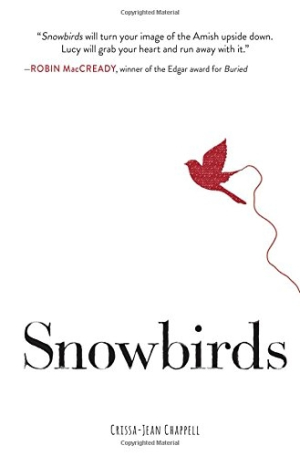Snowbirds
Lucy and her best friend, Alice, grew up in strict Mennonite and Amish religious groups with their own sets of rules. But when Alice rebels and tells Lucy she is running away with her boyfriend, Tobias, Lucy is stunned. She goes with Alice, Tobias, and another “Rumspringa” boy, Faron, to a party, in the aftermath of which her relationships with Alice and her old world will never be the same.
Lucy and Alice have a long, rich history. While Alice is rebellious and wild, Lucy is more controlled, though each is unsettled in her own way. Alice pushes Lucy outside her comfort zone, encouraging her to think through her beliefs and not settle for a way of life that feels comfortable. But Lucy also pushes Alice to a depth that all of Alice’s rebellion has not yet reached, forcing her to think beyond the fun and flirting that have thus far consumed her acts of defiance. While Alice rebels in a seemingly senseless and risky way, Lucy’s rebellion is more measured and calculated: Lucy wishes to go to college and study the ocean, despite her strict father’s disapproval.
Snowbirds focuses on two very different girls trying to find their places in a world where they don’t quite seem to fit. The novel offers a rich and complicated look at Lucy’s struggles: the choice between family, familiarity, and faith and an outside world of excitement and education is not a simple one, and Chappell does not portray it as such. Even more devastating are Lucy’s own struggles with guilt and fear as she deals with the aftermath of that fateful party, and what ensues is a gripping mystery as Lucy struggles to piece together exactly what happened on that terrible night.
Snowbirds is a pensive young-adult novel about friendship, rebellion, and the consequences of all the little choices we make. An ideal read for those looking for a nuanced look at the difficulties of growing up and breaking free from a world that has been so instrumental in shaping one’s identity.
Reviewed by
Stephanie Bucklin
Disclosure: This article is not an endorsement, but a review. The publisher of this book provided free copies of the book to have their book reviewed by a professional reviewer. No fee was paid by the publisher for this review. Foreword Reviews only recommends books that we love. Foreword Magazine, Inc. is disclosing this in accordance with the Federal Trade Commission’s 16 CFR, Part 255.

